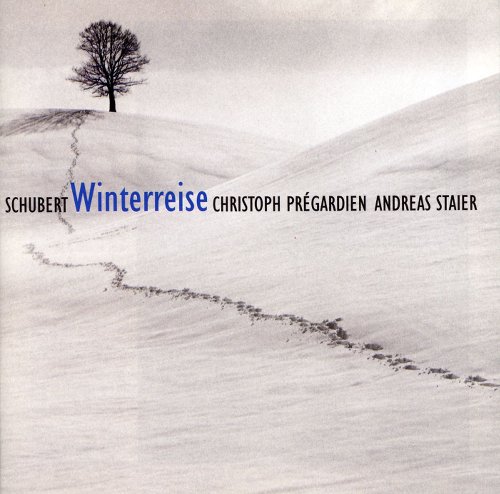
Christoph Pregardien & Andreas Staier - Schubert: Winterreise (1997)
BAND/ARTIST: Christoph Pregardien, Andreas Staier
- Title: Schubert: Winterreise
- Year Of Release: 1997
- Label: TELDEC Classics
- Genre: Classical
- Quality: FLAC (tracks)
- Total Time: 1:13:46
- Total Size: 241 MB
- WebSite: Album Preview
Tracklist:
01 Gute Nacht 6:09
02 Die Wetterfahne 1:39
03 Gefrorne Tranen 2:14
04 Erstarrung 2:42
05 Der Lindenbaum 4:54
06 Wasserflut 4:16
07 Auf Dem Flusse 3:35
08 Ruckblick 2:06
09 Irrlicht 2:58
10 Rast 3:21
11 Fruhlingstraum 4:30
12 Einsamkeit 3:09
13 Die Post 2:24
14 Der Greise Kopf 3:14
15 Die Krahe 2:04
16 Letzte Hoffnung 2:19
17 Im Dorfe 3:16
18 Der Sturmische Morgen 0:47
19 Tauschung 1:24
20 Der Wegweiser 4:08
21 Das Wirtshaus 5:05
22 Mut! 1:21
23 Die Nebensonnen 2:47
24 Der Leiermann 3:37
01 Gute Nacht 6:09
02 Die Wetterfahne 1:39
03 Gefrorne Tranen 2:14
04 Erstarrung 2:42
05 Der Lindenbaum 4:54
06 Wasserflut 4:16
07 Auf Dem Flusse 3:35
08 Ruckblick 2:06
09 Irrlicht 2:58
10 Rast 3:21
11 Fruhlingstraum 4:30
12 Einsamkeit 3:09
13 Die Post 2:24
14 Der Greise Kopf 3:14
15 Die Krahe 2:04
16 Letzte Hoffnung 2:19
17 Im Dorfe 3:16
18 Der Sturmische Morgen 0:47
19 Tauschung 1:24
20 Der Wegweiser 4:08
21 Das Wirtshaus 5:05
22 Mut! 1:21
23 Die Nebensonnen 2:47
24 Der Leiermann 3:37
The flood of performances on disc of this cycle never seems to subside... For a real challenge to the wealth of exceptional accounts already in the catalogue turn to Pregardien and Staier, who have something new and important to offer. From the very first song, we are in the presence of a sensitive, inward man in fear of his fate. Something is actually happening to this sufferer’s soul at the second “des ganzen Winters Eis”; indeed the whole final verse of the second song expresses the youth’s anguish. Just as memorable are the stab of pain in the repeated final line “Da ist meiner Liebstens Haus” at the end of “Wasserflut”, the introverted misery of the ice-carving of the loved one’s name in “Auf dem Flusse” and the almost mesmeric feeling in the final verse as the torrent rages in the protagonist’s heart. This is what the singing of this cycle is аbout: the exposing of raw nerves.
Staier is just as revelatory. Using his fortepiano to maximum effect, he finds so many fresh perceptions in his part, as in the precise weighting at the start of “Einsamkeit” and, as important, ones that accord perfectly with those of his regular partner. Here, by contrast with the EMI version, you have the sense of performers who have lived together with the cycle and conceived a unified, thought-through vision.
Listen to the way the pair mesh together to searing effect at the end of “Irrlicht”, or how they make use of the pregnant pause to increase the work’s drama as at the start of “Rast”, in which Pregardien displays an unexpected range of dynamics. The ineffable sadness of “Fruhlingstraum” (the text ideally articulated, the close quite properly trance-like), the raw blast of winter in “Der sturmische Morgen”, the tense weariness of “Der Wegweiser”, the weary half-voice of “Das Wirtshaus” – these and so much else contribute to the impression of a truly great performance, one to be placed on a plateau with Schreier (from whom Pregardien has learnt much) and Schiff. At the moment, I am under the spell of this new version, finding it the most convincing of all, allied as it is to a finely balanced recording by West German Radio and a booklet that simply presents us with material contemporaneous with Schubert’s time and leaves interpretative nuances to the performers and their audience at home. -- Alan Blyth, Gramophone
Staier is just as revelatory. Using his fortepiano to maximum effect, he finds so many fresh perceptions in his part, as in the precise weighting at the start of “Einsamkeit” and, as important, ones that accord perfectly with those of his regular partner. Here, by contrast with the EMI version, you have the sense of performers who have lived together with the cycle and conceived a unified, thought-through vision.
Listen to the way the pair mesh together to searing effect at the end of “Irrlicht”, or how they make use of the pregnant pause to increase the work’s drama as at the start of “Rast”, in which Pregardien displays an unexpected range of dynamics. The ineffable sadness of “Fruhlingstraum” (the text ideally articulated, the close quite properly trance-like), the raw blast of winter in “Der sturmische Morgen”, the tense weariness of “Der Wegweiser”, the weary half-voice of “Das Wirtshaus” – these and so much else contribute to the impression of a truly great performance, one to be placed on a plateau with Schreier (from whom Pregardien has learnt much) and Schiff. At the moment, I am under the spell of this new version, finding it the most convincing of all, allied as it is to a finely balanced recording by West German Radio and a booklet that simply presents us with material contemporaneous with Schubert’s time and leaves interpretative nuances to the performers and their audience at home. -- Alan Blyth, Gramophone
As a ISRA.CLOUD's PREMIUM member you will have the following benefits:
- Unlimited high speed downloads
- Download directly without waiting time
- Unlimited parallel downloads
- Support for download accelerators
- No advertising
- Resume broken downloads


